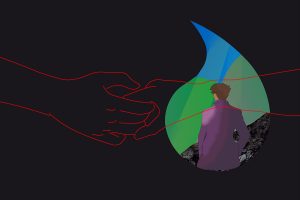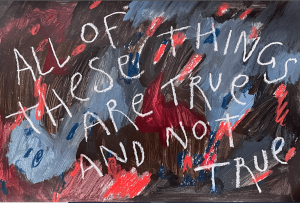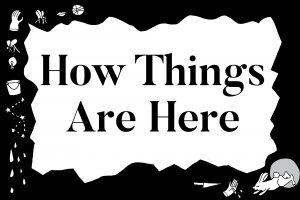
Interview with Torrey Peters
by Gaia Luce Clark Nevola | February 26, 2022
It is a warm summer day in Oxford and I wake up to find myself in the armchair where I’d been reading late into the night before. Initially, I had planned to only flick through Detransition, Baby once more so that it would be as clear in my mind as possible before the interview. However, under the spell of Torrey Peters’ writing style, I wound up reading the whole novel again, crying a lot, and getting very little sleep. Then, in a flash, it’s morning and I am face to face (or face to Zoom, I guess) with the woman whose writing had brought me to tears just twelve hours ago.
Peters is someone who I have been hoping to speak to for months. Best known for her debut novel, Detransition, Baby, she is also the first trans woman to have been nominated for the Women’s Prize for Fiction in 2021. Needless to say, I am nervous. Not only do I admire her work, but I’ve always been struck by how frankly she speaks in other interviews, at times rather candidly pointing out the ones she finds boring.
As soon as Peters joins the call, however, I realise I needn’t have worried. She immediately feels like someone it would be easy to spill your secrets to, an effect produced by both her dry, disarming humour, and her rather piercing hazel eyes. She tells me that her plan for the day is to wire up some solar panels in the old hunter’s cabin in Vermont she has spent lockdown renovating, trying to remember tutorials that she’d watched back in the Wi-Fi zone of the nearest town. This is all just to say that, apart from having the capacity to write with a stunning intensity, Peters also happens to be almost definitely cooler than you.
Still telling me about the cabin, she goes on:
TORREY PETERS: It’s coming along, I can stay here for four or five days pretty comfortably now. I think solar panels will be nice, but I like it now too. It’s funny to have to fall asleep when it gets dark out.
GAIA LUCE CLARK NEVOLA: I get that. I’m half Italian, and in Italy they call it ‘Effetto Gallina,’ which is like, ‘the chicken effect.’ I guess it’s because you go to sleep like a chicken does: the minute it gets dark.
PETERS: Absolutely. I like that phrase a lot.
CLARK NEVOLA: Not to say you’re living like a chicken!
PETERS: No, it’s pretty close. I’m not offended, It’s accurate. It’s 8am.
(laughter)
CLARK NEVOLA: Now, before we start on the questions about Detransition, Baby, I guess I wanted to ask you a little bit about your earlier work and your novellas. I haven’t read all of them, but I know they are often about the apocalypse or horror. What is it about those genres that appealed to you, and would you like to get back into them?
PETERS: Yeah so, I was writing those in a particular moment, in a Brooklyn trans scene. At the time, there was really only one place that was publishing trans women, creating a sort of scarcity where we had to fight amongst ourselves for publishing slots. So I was like, if we all self-publish, then we can have as many slots as there are, you know, copies of Adobe in the world. However, I needed a format that was doable and didn’t take 3 years to write, so I encouraged trans girls to write novellas. They are cheap to publish and quick to read, which means you can just say ‘I’m going to try out this new author’ without too much commitment. I didn’t want to write something literary and hard because it wouldn’t circulate in the same way, so I went for things that were sticky and fun. I’ve always had a soft spot for horror for that reason – it’s compelling. I can’t watch horror, but I like reading it.
Speaking to your question more, writing horror also had the secondary effect, which I think is probably more speaking to your question, of allowing me to not have to be respectable. One of the hardest parts about writing as a trans woman is the fact you have to represent people, and people are like: ‘Ah, this is like speaking for the trans experience.’ That’s how it ended up with Detransition, Baby; people were like ‘this is me,’ ‘this isn’t me,’ ‘I don’t see myself in this,’ or ‘I do see myself and I’m upset about it.’ However, the thing about horror is that nobody is looking for positive representation there. My first novella was about a cop who got bad plastic surgery, a masking fetishist, and a cowardly sissy, but no one was fussed and, as a result, I had this real freedom to write, the kind you get when you’re not writing from an identity position. I might go back to genre for that reason, it really is quite liberating to write in genre because you’re not asked to do that identity work. Also, historically, a lot of really interesting trans writing has been pulpy books, smut, and noir.
CLARK NEVOLA: Yeah, that makes so much sense, it’s a really interesting answer. I’m curious, do you have a book that you’d recommend to everyone?
PETERS: I have two answers. I have the book that I’ve been recommending to everyone while doing press, which is Time Is the Thing a Body Moves Through by my friend T. Fleischmann. But I’m going to add one more to that, which is a book that I just constantly go back to. It’s Independent People… I can’t believe I’m blanking on the author’s name – how embarrassing for me. It’s the Icelandic author who won the Nobel… Halldór Laxness. But yeah, it’s just about a really annoying sheep farmer in Iceland, and it’s full of fallibility, hypocrisy, sheep jokes. I just feel like it’s a book that has everything of what it means to be human in it.
CLARK NEVOLA: Hah! Thank you. Now, I don’t want to quote your own book back at you, because that’s just so embarrassing, but there’s a bit when you’re talking about ‘the iciness of truth’ and telling truths invertedly. Going back to the way you were talking about representation in your early work, has the amount of truth and vulnerability in Detransition, Baby ever felt ‘icy,’ with people regarding it as their own identity and, in doing so, maybe have a lot to say about how that felt for them?
PETERS: It felt pretty bad for the first couple of weeks because it was this thing that I had sat with by myself for years, so I felt it was, like, mine. But when it was released, other people sort of took it on as theirs, and took it differently than how I intended it, which maybe is how it is for all authors. The interesting thing about publishing on a big press is that your work gets to so many people and so many reviewers. I think about four or five weeks after Detransition, Baby was published, it began to stop feeling like mine. The novel which had my vulnerability within it became a different thing from the novel that was out there in the world. I think that’s sort of a metaphor for the way that most of us see ourselves. Like, there’s our actual selves that we feel are true, and then there’s a kind of persona that we create for ourselves in the world. While not quite the same, it’s akin to the way that an internet persona feels. If somebody doesn’t get my internet persona, I don’t think ‘You hate me,’ or ‘You don’t get me,’ I’m just sort of like, ‘Wow, that persona didn’t work for you.’ Am I separate from this persona? Definitely, because no persona can convey everything that I am. That’s how the book, as it exists in the world, has come to feel. There’s a secret book of my heart and a secret way that I feel about the book, and then there’s the book as it exists in the world, which other people are going to have opinions about. COVID also made the release very particular because the idea of me in the world has changed, but my life hasn’t. For me, if someone is staring, even if they’ve read my book, it’s probably because they’re just staring at me. I don’t think many people would recognise me.
CLARK NEVOLA: Hm, I guess. I’ve heard you’re very famous for your motorbike though, right? So perhaps if you were on your bike then it would be a different thing… just while I’m on this tangent, how did you get into biking?
PETERS: I’d just moved to Brooklyn, and I felt very meek. I had just transitioned and sometimes, especially post-transition, you don’t want to have attention, especially if you’ve had some bad experiences. I felt like I never took up any space, never asserted myself. So, I got a motorcycle. It’s a way of kind of taking up space but in a sort of safe way. I can have a presence and, at the same time, if I ever need to, I can just, you know, turn the throttle and I’m gone. It’s very easy to get around the city on a motorcycle. It was also a way to talk to strangers. When you have a motorcycle, people want to talk to you about it, and it was a pleasant way to have conversations because it was never going to be about my body, it was going to be about the motorcycle. Then, of course, everyone thought it was my boyfriend’s bike or something, so I painted it pink.
CLARK NEVOLA (laughter): Naturally. Did you name your bike?
PETERS: I never named it, no, but I do name my cars. My Prius’ name is Bernice.
CLARK NEVOLA: Oh, amazing.
PETERS: She’s like an old lady, so she’s got an old lady name. I don’t know why I didn’t name the motorcycle, it just didn’t come to me.
CLARK NEVOLA: Yeah. So, I’m running the risk of doing the thing you said about taking the novel away from what you meant it, but here I go. While I was reading it, I was thinking about my own non-binary identity and especially about how it’s often characterised by a dizzying openness and pro-active story building. Obviously, I’m not saying that Detransition, Baby is the first novel to have an inconclusive end, but I was wondering if you think there’s something about trans thought or trans experience that aligns with this style of ending, and the way that readers are made to narratively procreate the ending, if that makes any sense?
PETERS: Yeah, it absolutely makes sense. I would say that there’s nothing that inherently links transness and openness. A lot of time, people like to talk about transness as something in which ‘you can be anything.’ I see that’s not what you asked or were saying, but many people do say that, and I think that actually, in many ways, transness is as bounded as any other gender experience. It can be as confining to be trans as it can be to be cis. However, to answer your question, I think there’s something in this particular moment for trans people that does speak to openness. This is what I was speaking to, the possibilities for life as a trans woman. Trans men and non-binary people probably experience this too, but for trans women especially, I think the possibilities for life are much more because we are inventing them right now. For so long, the project for trans women was survival. It wasn’t necessarily flourishing or taking our place in society, it was mostly just day-to-day. It was ‘how am I going to make money?’; ‘how am I going to have some modicum of joy in the near future?’ However, suddenly the time horizon for trans women is quite different. I talk about this a lot with friends when they say, ‘Oh, I missed my moment, for transness’ and I’m like, ‘you didn’t miss the moment, this is the moment!’ This is the moment in which we get to invent what it means to be trans, and part of that is creating the media that we’re in, you know, like Detransition, Baby. I think that might be the first trans book lot of people read that wasn’t educational, but a media experience. People in my generation, we get to invent transness for ourselves. Subsequent generations are going to iterate on it, but we’re laying a lot of the groundwork. It’s unclear what that’s going to look like, what will succeed, and what will advance. That’s the challenge, and that’s the reason why I think I thought specifically about leaving the book open at the end: it’s our job to invent it. The openness of the ending, for me, is a challenge to my generation of trans women, like, are you going to stop? How are you going to invent family? How are you going to invent a place for yourself in the world? How are you going to come up with new rules and new structures? So, circling back again, yes, I think the openness has something to do with the moment of invention that we as trans women are actually in at this juncture.
CLARK NEVOLA: Thank you, that was just wonderful. Not wonderful in a kind of stultifying way, just a really good answer. Now, I’ve got lots of questions, but I don’t want to take up more of your time.
PETERS: Do you want to do one more?
CLARK NEVOLA: Of course! Yeah, let’s do one more. Then I’ll let you get back to those solar panels. For my final question, I wanted to ask if you always knew you wanted to be a writer, and how that came about. Also, do you have advice for young LGBTQ+ writers, or indeed writers in general?
PETERS: So, I was a reader long before I was a writer, and I only started writing when I was in college. Back then, I was writing for everybody and nobody; I didn’t know who I was or who I was writing for. Then, during my transition process, I was sort of disillusioned, so I didn’t write for about five years. However, what I learnt is that, when I have an audience in mind I write with a real sense of urgency. This was a really important lesson. When I wrote Detransition, Baby I had perhaps ten people in mind, mostly of trans women and, in particular, trans women who had something urgent to say. Specificity of voice is what I would recommend any new writer to find; find the reader to whom you have something to say, and really speak urgently to that reader.
CLARK NEVOLA: Wow. That is very wise advice.
PETERS: Thank you.
CLARK NEVOLA: No, thank you. Best of luck with your renovations and everything that you’re going to be doing in the next year.
PETERS: I hope to have more books to talk about soon, both by me and maybe by you. Bye! ■
Words by Gaia Luce Clark Nevola. Art by Natalie Hytiroglou.




